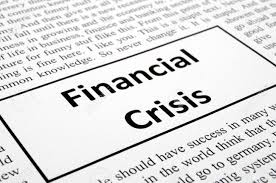The International Monetary Fund has rung the warning bells once again. It has clearly declared that the political leaders hailing from different parts of the globe should brace themselves for an economic slump as World Economy is heading for big time stagnancy in the days to come. So, what exactly has led IMF to think on these lines? Let us explore.
Are we staring at another financial crisis?
To start off with, let us tell you that the IMF has actually gone on to bring a number of reasons to the fore – contributing to the impending financial crisis we are presently talking about here.
Firstly, the IMF has held the pessimistic growth projection of the UK from 2.2 percent to 1.9 percent responsible for such predictions at the present moment. There is major uncertainty clouding the EU referendum.  The decision to cut down on growth projection from 2.2 to 1.9 percent is even more pessimistic than Office for Budget Responsibility’s forecast of 2 percent at the budget. Surprisingly enough, the forecast came in the midst of hopes that UK is poised to grow faster than almost all the countries, excluding Spain and the US. Not to forget, the poor growth forecast has clearly been attributed to a wide number of reasons including China’s financial crisis and the exposure of the world economy to terrorism and migrant crisis.
The decision to cut down on growth projection from 2.2 to 1.9 percent is even more pessimistic than Office for Budget Responsibility’s forecast of 2 percent at the budget. Surprisingly enough, the forecast came in the midst of hopes that UK is poised to grow faster than almost all the countries, excluding Spain and the US. Not to forget, the poor growth forecast has clearly been attributed to a wide number of reasons including China’s financial crisis and the exposure of the world economy to terrorism and migrant crisis.
Maurice Obstfeld, who is the economic counselor of the IMF opined that it has been too long since the global economy has been too slow. As such, it has very easily become vulnerable to negative risks. According to him if the economic growth is below stalling speed with insufficient demand to escape low growth then it only leads to deflationary equilibrium.
Saddening Projections and what we should do
Much to our plight, the institution’s evaluation made for the bleakest projection since 2009. Policy makers as such are required to devise strategies keeping the possible adverse outcomes in view. Maurice Obstfeld, however, didn’t have words of hope to offer in this respect as well. He said that the policy makers don’t have much time in their hands to prepare contingency plans to deal with possible risks in the future.
The need of the hour is to beef up reform efforts. Countries with scope for better finances should cash in on the record reduction of rates of interest and invest in infrastructural ventures and offer tax relief to the private sector research and development.

Leave a Reply